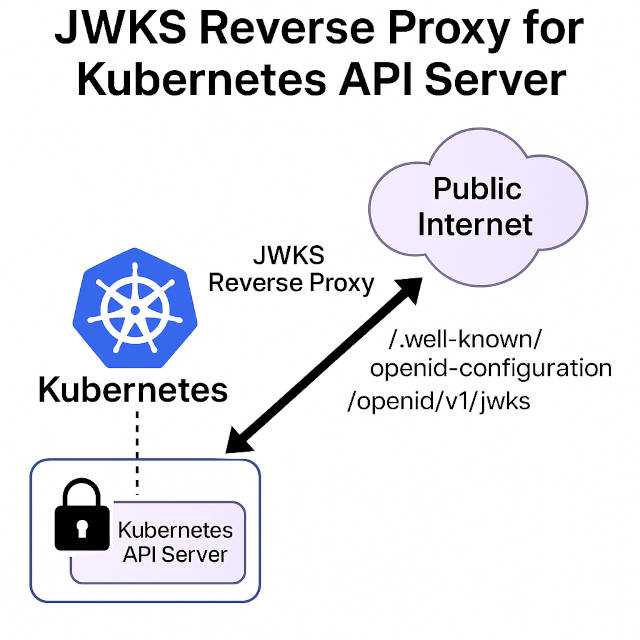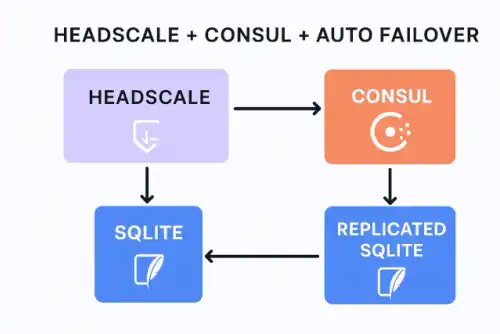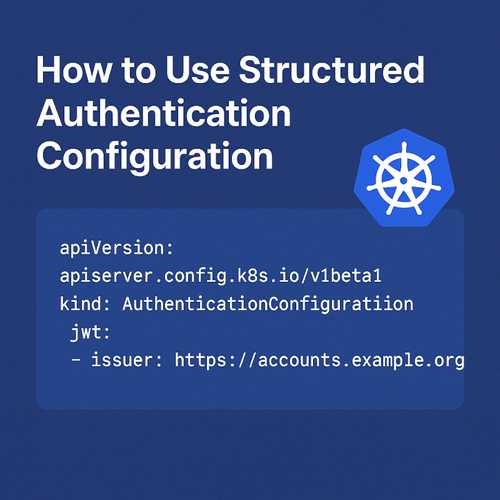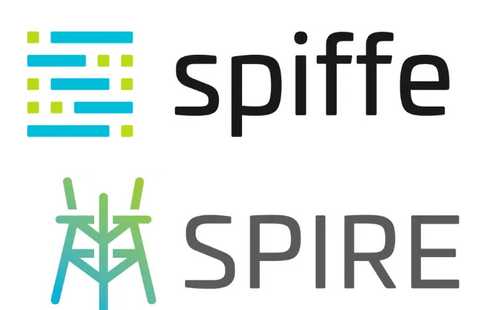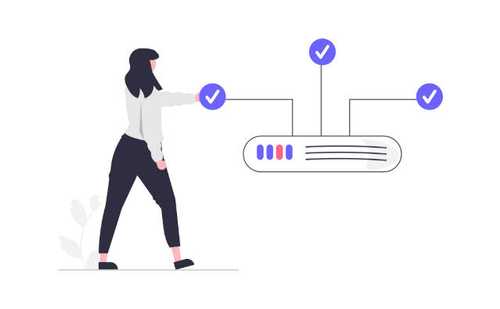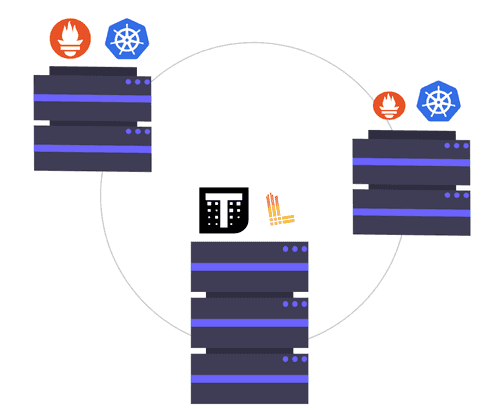🧩 The Problem
Kubernetes supports OIDC authentication, enabling identity integration with other platforms or systems, where you can authenticate kubernetes jwt tokens.
However, there's a hidden challenge with securely exposing the OIDC discovery endpoints (i.e. /.well-known/openid-configuration and /openid/v1/jwks)
from the Kubernetes API Server and also preventing anonymous access.
If you are running a hardened Kubernetes cluster with --anonymous-auth=false (you should in production),
these endpoints are not accessible publicly — which breaks identity integrations that rely on open JWKS URIs.
✅ The Solution: JWKS Reverse Proxy for Kubernetes
We’re excited to introduce k8s-jwks-proxy — a secure, lightweight reverse proxy writing in go purpose-built to expose your Kubernetes OIDC discovery endpoints safely and with minimal configuration.
🔗 GitHub Repository →
https://github.com/gawsoftpl/k8s-apiserver-oidc-reverse-proxy
🛠 What It Does
The proxy authenticates to the Kubernetes API Server utilizing its in-cluster Service Account token, verifies the TLS certificate of the server using the Kubernetes CA bundle, and securely forwards only those two endpoints:
- /.well-known/openid-configuration
- /openid/v1/jwks
There is no need to lower the security of the cluster or mess with extra certificate.
🚀 Key Features
- Secure by Default: No anonymous access is permitted. All traffic is authenticated.
- Light & Fast: Developed in Go with no dependencies on anything external whatsoever.
- Production Grade: It's easy, stable, and deploys in any Kubernetes cluster.
- RBAC compliant: Our Service Account requires only one minimal non-resource access.
📦 How to Install?
Helm Chart (Recommended for Kubernetes)
helm repo add k8s-jwks-proxy https://gawsoftpl.github.io/k8s-apiserver-oidc-reverse-proxy
helm repo update
helm install k8s-jwks-proxy k8s-jwks-proxy/k8s-jwks-proxy
Full example:
Below example showcases how to create a local test Kubernetes cluster with kind while also setting custom OIDC issuer settings for the API server, installing the NGINX Ingress Controller, deploying the k8s-jwks-proxy Helm chart with ingress enabled (thereby publicly exposing the OIDC discovery endpoints under a custom domain (oidc.example.com).
The important aspect here is that the proxy was able to expose the /.well-known/openid-configuration and the /openid/v1/jwks
endpoints without any changes made to the Kubernetes API server's --anonymous-auth setting, or adding any additional
RBAC permissions other than the absolute minimal non-resource read access.
Create test cluster
# Create test cluster with custom oidc issuer
cat <<EOF > kind-cluster.yaml
# kind-cluster.yaml
kind: Cluster
apiVersion: kind.x-k8s.io/v1alpha4
name: custom-api-server-args
kubeadmConfigPatches:
- |
kind: ClusterConfiguration
apiServer:
extraArgs:
service-account-issuer: "https://oidc.example.com"
service-account-jwks-uri: "https://oidc.example.com/openid/v1/jwks"
nodes:
- role: control-plane
EOF
# Create cluster with custom config
kind create cluster --config ./kind-cluster.yaml
# Create local load balancer for cluster read more: https://gawsoft.com/blog/how-to-enable-load-balancer-in-kind-cluster/
cloud-provider-kind &
Install nginx ingress controller
helm repo add ingress-nginx https://kubernetes.github.io/ingress-nginx
helm repo update
helm install nginx-ingress ingress-nginx/ingress-nginx -n nginx --create-namespace
Update helm repo
helm repo add k8s-jwks-proxy https://gawsoftpl.github.io/k8s-apiserver-oidc-reverse-proxy
helm repo update
Install helm chart with k8s jwks proxy to your cluster
cat <<EOF > values.yaml
ingress:
enabled: true
className: nginx
host: oidc.example.com
annotations:
# If you have installed cert-manager and setup clusterIssuer with name letsencrypt-http, you can auto generate tls cert
# More info: https://cert-manager.io/docs/usage/certificate/
cert-manager.io/cluster-issuer: "letsencrypt-http"
tls:
- hosts:
- oidc.example.com
secretName: oidc.example.com
EOF
helm upgrade --install k8s-jwks-proxy -f values.yaml k8s-jwks-proxy/k8s-jwks-proxy
# Get ingress ip
IP=`kubectl get svc nginx-ingress-ingress-nginx-controller -n nginx -o jsonpath='{.status.loadBalancer.ingress[0].ip}'`
echo $IP
# Example requests
curl -k https://oidc.example.com/.well-known/openid-configuration --resolve "oidc.example.com:443:$IP"
curl -k https://oidc.example.com/openid/v1/jwks --resolve "oidc.example.com:443:$IP"
The JSON responses returned from the endpoint both contain the required OIDC metadata, and also the JWKS keys, and are ready for consumption by either identity providers or third-party systems — securely, and with very little configuration needed to get started.
{
"issuer": "https://oidc.example.com",
"jwks_uri": "https://oidc.example.com/openid/v1/jwks",
"response_types_supported": [
"id_token"
],
"subject_types_supported": [
"public"
],
"id_token_signing_alg_values_supported": [
"RS256"
]
}
{
"keys": [
{
"use": "sig",
"kty": "RSA",
"kid": "gK8g4Dw_EkSBBa-IfWnXOyLLQwomf8ZyiRvM77BubTs",
"alg": "RS256",
"n": "tqXkdNE30zn2Gmi5NeT_EomMYKJQRmcIOUqOoNKUvveiL1a_51OYtLjsssvwVY80nJ6nNqSZGkV2PSjorOa9H4pwimlKXRPRJmfme6MmRIQIOUZCxntB2JToP0aQdbo5O_rTH-z6hW_iyd9Y6yN8uW2zDBRw5aNQXx665008ooDQ2p3GR7aaF3KvBiv1rYKLk97PlTGvCDZNb_zuiZKuKR1sNp1QHQolSMTILKEpCRV8vP8j-SG-9LjGJGFiv1JNyYn0n7uyNL076qkU6YVjVu-0I6tcIlTNFvYzVzLnn8qCiMoEf1ZQSDyCdpoGBu6jtw2NvYg95EEp7W-VZ8wHVw",
"e": "AQAB"
}
]
}
After retrieving and storing the response from the JWKS endpoint, it is possible to authenticate outbound requests from the Kubernetes cluster Kubernetes service or id_token, enhancing security and access control.
